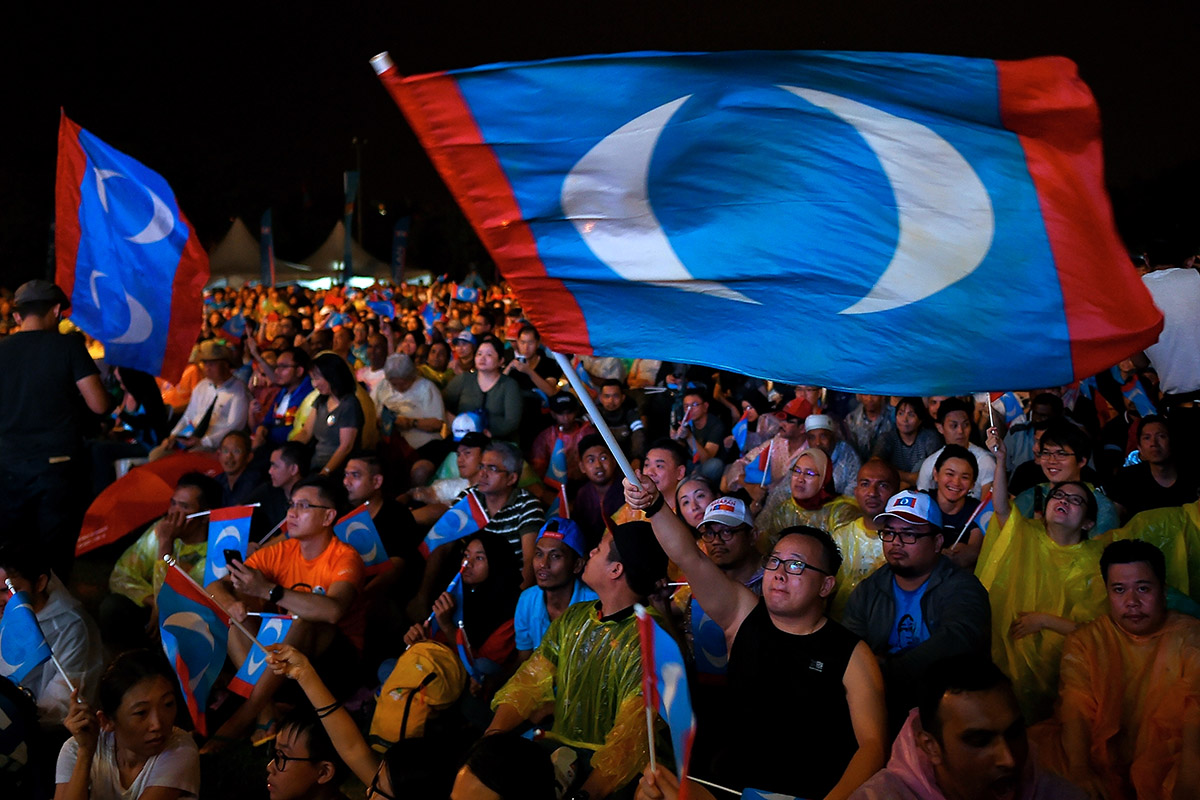On 9 May 2018, Malaysians from all walks of life will go to the polls in what has been dubbed “the mother of all elections.” The elections on Wednesday, the country's 14th since gaining independence in 1957, will decide whether the National Front (Barisan Nasional) will continue ruling Malaysia as it has for the past 61 years. If it wins, Barisan Nasional will continue to be the longest ruling political party in the world.
This election is unlike any other in Malaysia’s history. The incumbent Prime Minister, Najib Razak will be challenged by his once mentor and former Prime Minister, Dr. Mahathir Mohamad. In an unlikely turn of events, the latter is currently leading the coalition which was once led by his former political nemesis, the jailed Anwar Ibrahim.
In 2016, Dr. Mahathir quit the United Malay National Organisation (UMNO) party led by Najib Razak, which leads the Barisan Nasional coalition, citing that Mr. Najib has changed the party’s core principles and is using it to protect his own interests. However, some say that Dr. Mahathir left the party because of his son who was forced to step down as the Chief Minister of Kedah due to internal party disputes as well as his personal ambitions to establish a political dynasty. Dr. Mahathir would go on to establish the Malaysian United Indigenous Party (Parti Pribumi Bersatu Malaysia), better known as Bersatu which would then subsequently join forces with the opposition coalition to oust Mr. Najib.
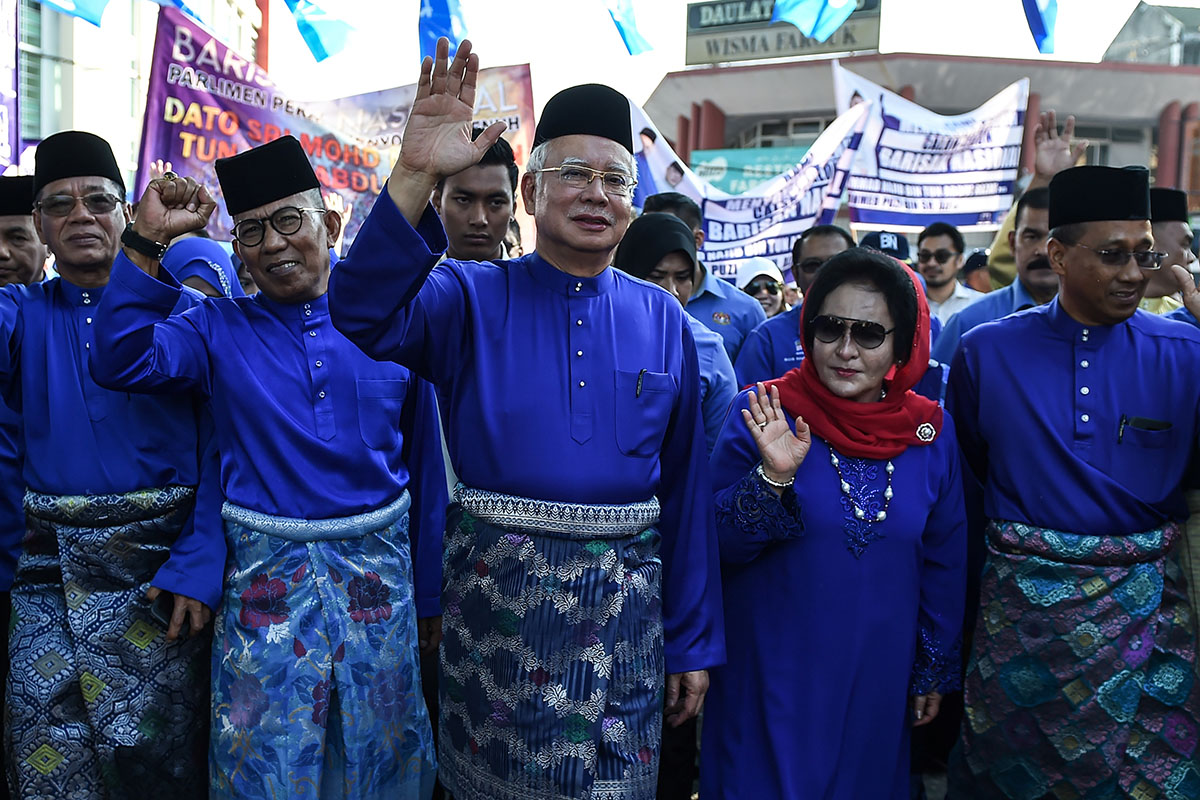
Malaysia's Prime Minister Najib Razak (C) and his wife Rosmah Mansor arrive at the nomination centre to hand over election documents in Pekan on April 28, 2018. Malaysia's 14th general election will be held on May 9 with nominations taking place on April 28. (AFP Photo/Mohd Rasfan)
On-going, Mr. Najib was also being plagued by the 1MDB scandal where it was alleged that US$681million was embezzled from a strategic development company he was overseeing and allegedly made its way into his personal bank account. Mr. Najib and his associates strongly dispute these allegations citing that they are politically motivated and that in fact, the funds had been a donation from the Kingdom of Saudi Arabia.
At present, Dr. Mahathir is the leader of the opposition coalition also known as the Alliance of Hope (Pakatan Harapan). This coalition succeeded the People’s Alliance (Pakatan Rakyat) which was dissolved in 2015 after the Malaysian Islamic Party (Parti Islam Se-Malaysia) or PAS, quit the coalition. Pakatan Harapan is made up of Dr. Mahathir’s newfound party, Bersatu, People’s Justice Party (Parti Keadilan Rakyat) or PKR, National Trust Party (Parti Amanah Negara) or Amanah and the Democratic Action Party or DAP. While some have criticised Dr. Mahathir’s inclusion in the coalition considering his past as the Prime Minister, many in the coalition believe that he will be instrumental in bringing in the key rural Malay votes for the party. There are also many critics who question the opposition coalitions means of victory, where the ends justify the means. Many of the leaders of the opposition pact were previously strong and fierce critics of Mahathirism during his 22-year iron fist rule.
These series of events have brought more controversy to an already contentious general election. For some, a scandal-ridden leader is not fit to lead the nation, whilst for others a defeat for the ruling party could raise fears of instability and the loss of Bumiputra privileges for the ethnic Malays granted under the New Economic Policy, an affirmative action policy.
Most polls show that the Barisan Nasional will hold on to power with a slimmer majority than the last general elections. However, the sentiment on the ground paints a very different picture.
Changing tides
Over the last 11 days of campaigning, there has been a growing trend of declining support for the ruling Barisan Nasional. Turnouts in urban centres and rural areas for Pakatan Harapan’s ceramah (rallies) led by Dr. Mahathir and his entourage consisting of jailed former deputy Prime Minister Anwar Ibrahim’s wife Wan Azizah (PKR), Lim Kit Siang (DAP), and Mohammad Sabu (Amanah) have seen huge crowds.
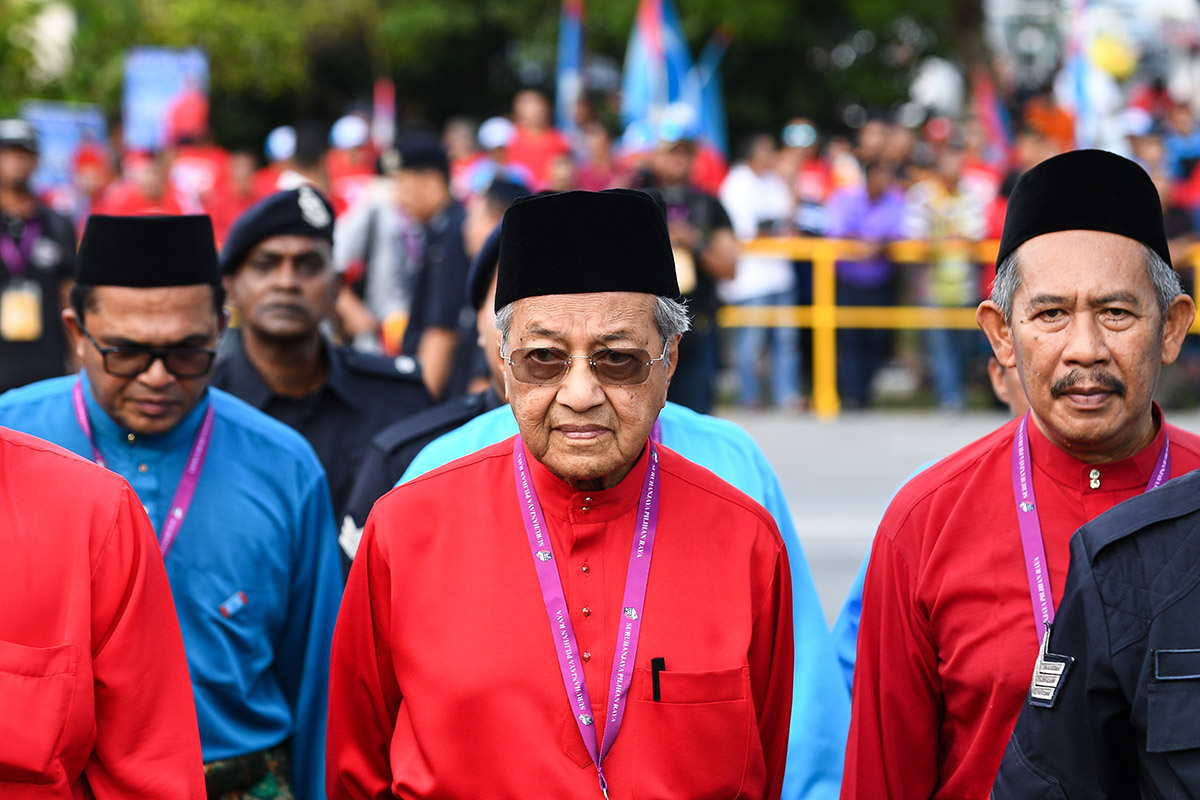
Former Malaysian prime minister and opposition party Pakatan Harapan's prime ministerial candidate Mahathir Mohamad (C) arrives to submit his election nomination for the upcoming 14th general elections in Langkawi on April 28, 2018. Malaysia's 14th general election will be held on May 9 with nominations taking place on April 28. (AFP Photo/Manan Vatsyayana)
In a recent interview with a local media outlet, Dr. Mahathir expressed a strong hope that the Pakatan Harapan coalition will be able to secure victory. He added that throughout his long political career he had not seen such a momentous drive by the rakyat (citizens) for a change of government. The sentiment towards increasing household expenditure, rising fuel costs, and the hugely unpopular Goods and Services Tax (GST) along with rising inflation have driven this negative sentiment towards Mr. Najib’s administration.
The rushing through of the Anti-Fake News Bill 2018 and the alleged unfair redrawing of electoral boundaries in favour of the Barisan Nasional ruling government was deemed the final straw for the rakyat who want Mr. Najib and his government removed from office.
However, Mr. Najib’s counter to the above argument is that he inherited an economy which was heavily subsiding the rakyat on the back of falling oil prices and there was an urgent need to diversify the economy and create new revenue streams. To his credit, the World Bank recently revised Malaysia's growth estimate four times in just a year, proving the Malaysian government's efficacy in managing the economy. He has also maintained that if the country’s revenue increases, it will be distributed to the rakyat, in particular to those from the Bottom 40% and Middle 40% income groups of society in various forms of government assistance.
Mr. Najib also reiterated the country’s improved economic situation that allowed the Malaysian Government to increase the 1Malaysia People's Aid (“BR1M”) handouts, a form of one-off cash payment to the rakyat which Dr. Mahathir is a huge critic of, citing it as a form of dedak (enticement).
Despite the tireless efforts of Mr. Najib and his Barisan Nasional coalition to set things right, negative sentiment from the issues mentioned here coupled with his alleged involvement in multi-billion-dollar scandals locally and internationally have become too large to manage. Many are now worried about Malaysia’s loss of reputation on the international stage and sees this as the tipping point as the country slowly regresses.
Rural votes the deciding factor for GE14?
The rural bloc, historically a Barisan Nasional stronghold, represents a crucial demographic for the opposition and ruling coalition alike. The rural vote is represented by the so-called “FELDA seats”, an estimated 52 parliamentary seats with existing settlements under the Federal Land Development Authority (FELDA), the country’s national palm oil plantation operator which was set up by Mr. Najib’s late father.
While the majority of these seats will likely remain in the hands of Barisan Nasional, analysts have pinpointed 20 hot seats which may hold the key to a dark horse victory by Pakatan Harapan, with the majority of these located in the southern state of Johor in Peninsula Malaysia.
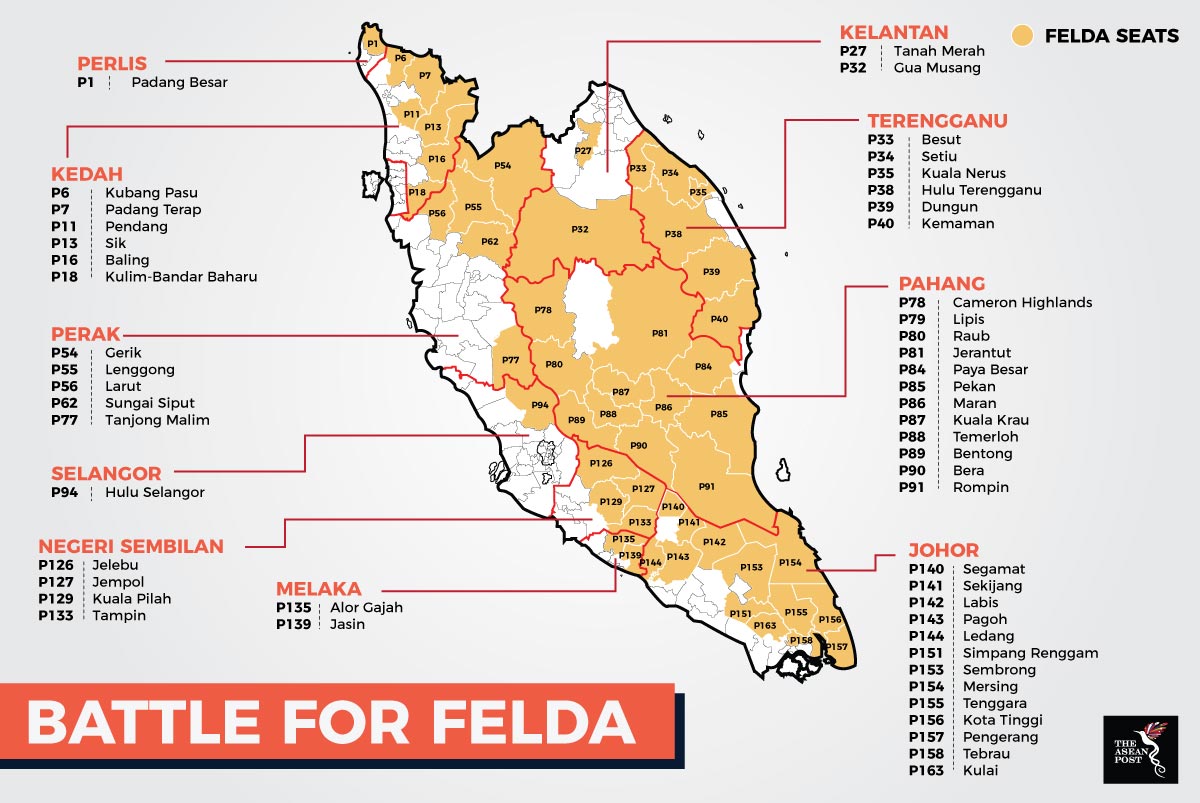
Rural-urban divide
Constituencies such as Segamat, Sekijang, Labis, Pagoh, Simpang Renggam, Tenggara, Tebrau and Kulai represent possible FELDA swing seats in the southern state of Johor, UMNO’s birthplace and fortress. Despite the uncertainty, regional research institutes such as the Yusof Ishak Institute have projected an overall Barisan Nasional victory in Johor for GE14 in its January 2018 Trends in Southeast Asia report. A more recent report published earlier today by an independent think tank suggested that Pakatan Harapan has made great headway into the Johor heartland and is set to wrest the state from Barisan Nasional.
Despite the shrinking rural population in Malaysia due to inward migration and the rapid urbanisation of capital cities, disgruntlement in the agriculture sector has been on the rise in recent years, largely attributed to increased operating costs, lower commodity prices and labour woes. Statistics from the Ministry of Human Resources stated that out of 37,699 retrenched employees in 2016, skilled workers in the agriculture, forestry, livestock and craft sector represented the third hardest-hit demographic. This dissatisfaction has worsened in 2018 and is seen as a possible catalyst for a Pakatan Harapan swing vote among FELDA constituencies, despite the relatively small number of rural voters and their established voting patterns. Other factors include the drop-in value of FELDA Global Ventures Holdings Bhd (FGV) stock from its initial public offering (IPO) price of US$1.14 (High as US$1.37) in June 2012 to US$0.41 as of 8 May 2018, close of business.
Founded in 2007 as FELDA’s commercial arm, FGV’s IPO saw the allocation of 800 shares each to an estimated 110,000 settlers, with a reported 90 percent of these taking out soft loans to purchase their shares. There are an estimated 119,000 FELDA settlers in Malaysia as of this year, accounting for some 1.2 million votes in total when taking wives, children and grandchildren into consideration, as well as employees of FELDA and related companies.
During the nation’s 13th general election in 2013, Barisan Nasional took 48 out of 52 FELDA seats contested, in a coup widely credited as a deciding factor in the ruling coalition’s continued dominance.
Trading manifestos
One of the key deliverables of the Pakatan Harapan manifesto is the abolishment of the Goods and Services Tax (GST) and reduction of the cost of living. It also plans to stabilise petrol prices and write-off FELDA settlers’ debts. That aside it promises to investigate and reform 1MDB, FELDA, MARA (a Bumiputra endowment fund) and Tabung Haji (Muslim Pilgrimage Fund). All of these institutions have been alleged to have undergone some form of misappropriation and/or embezzlement under Mr. Najib’s administration.
Most analysts however have considered the manifesto as a populist agenda as it would be difficult to deliver on some of the promises made, such as removing mega projects awarded to foreign countries that would involve huge termination and settlement costs, not to mention possible geopolitical tensions.
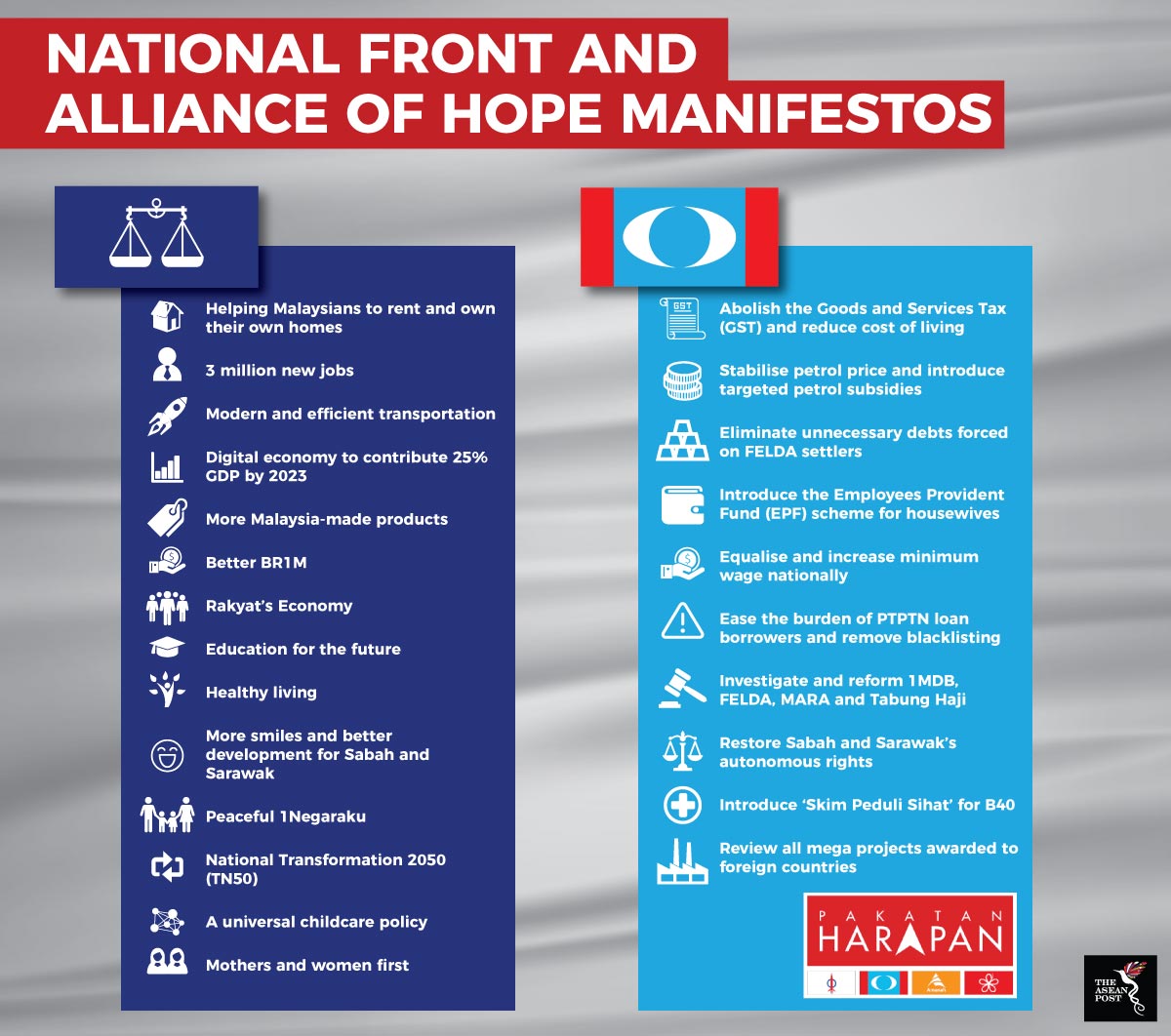
The Barisan Nasional manifesto on the other hand, promises continuity and added incentives to the existing economic reforms and diversifications that have been brought about by Mr. Najib’s administration. It will also reinsure investors and fund managers both, locally and internationally as well as regain their commitment to further invest in Malaysia.
However, recent campaigning sentiment suggest that the rakyat are willing to forego the stability and continuity of Barisan Nasional in exchange for a reformist agenda. A change that Malaysians from all corners of the country and walks of life are craving for, following 61 years of rule. The added spectre of multi-billion-dollar scandals have also plagued and tarnished the country’s international credibility. However, at what cost will this change come at, is left to be seen if Malaysians go to the polls and Pakatan Harapan turns out victorious.
The chances are tight, dead-tight according to analysts globally and the FELDA votes are crucial.
“The overt campaign talks about issues of the economy and cost of living, but underneath that there is a continuing discussion about who is best suited to maintain the interests of the majority Malay Muslim population,” said Ibrahim Suffian of the Merdeka Centre in a recent interview with the Washington Post.
The reality of the matter is Barisan National’s UMNO has a proven track-record of protecting and promoting Malay rights in Muslim majority Malaysia, delivering on government initiatives, preserving economic stability and racial and religious harmony in multicultural Malaysia.
Possible outcomes
Most polls predict a slim victory for Barisan Nasional. However, recent events such as the Brexit referendum and election of Donald Trump illustrates that in the political arena anything is possible. There are four likely outcomes to this election – a hung parliament, a slim Barisan Nasional win, an overwhelming Barisan Nasional win, or a slim Pakatan Harapan victory.
A hung parliament would be an unprecedented event in Malaysian history. This could materialise if none of the contesting coalitions secure the required 112 seats to form a simple majority. If this happens, PAS would most likely become the kingmaker as they continue to operate independently following their exit and dissolution of the Pakatan Rakyat alliance, enabling them to easily form a pact with whomever. PAS has even expressed their willingness to help any coalition form a government as long as they agree with PAS’ Islamic agenda, amongst other being the application of Hudud laws.
Aside from that, reasonable speculation can be made that with this being labelled by many quarters including the likes of The Economist as the “dirtiest election ever”, that Members of Parliament (MPs) from both sides could potentially jump-ship to form a majority, if such a situation transpires.
In the situation of a slim Barisan Nasional win, there are predictions that the party will manoeuvre the removal of Mr. Najib, especially if Barisan Nasional wins by a slimmer majority than the last general elections. While Barisan Nasional retains its mandate, a slimmer majority would indicate that Mr. Najib has compromised the party’s grip on power, as was the case with former Prime Minister Abdullah Ahmad Badawi in 2009 after winning the 2008 general elections with a slimmer majority.
If Barisan Nasional wins with an overwhelming majority, Mr. Najib will come out stronger than ever. He will use the results to prove how the alleged scandals are false and have not affected him. Dr. Mahathir will be left in the past as Mr. Najib heralds in his vision of a future Malaysia. Malaysia would see economic prosperity and political stability and stride towards the Barisan Nasional’s Transformation National 2050 programme, a national development programme similar to Dr. Mahathir’s Vision 2020.
Conversely, if Pakatan Harapan manages to pull off a surprising win, the country will see the return of Dr. Mahathir as Prime Minister. This will be the first transition of power in the history of the country and due to the uncertainty of such a situation it is expected that investors might pull out from the country unless given assurances of a stable economy. It is also very likely that Mr. Najib would step down as UMNO President if Pakatan Harapan wins.
The above scenarios present very likely outcomes for Malaysia tomorrow however the choice of government of the day rests in the hands of the rakyat. Do the rakyat go for stability and continuity or change and renewed hope?
